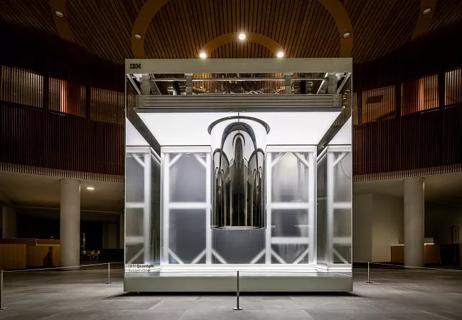Cleveland Clinic is a Founding Partner in Quantum Innovation Hub

Cleveland Clinic has been selected as a founding partner and the leading healthcare system in a new initiative meant to spur collaboration and innovation in the quantum computing industry.
Advertisement
Cleveland Clinic is a non-profit academic medical center. Advertising on our site helps support our mission. We do not endorse non-Cleveland Clinic products or services. Policy
Based in Greater Washington, D.C., the nonprofit development organization Connected DMV and a coalition of partners are developing the new Life Sciences and Healthcare Quantum Innovation Hub. Its purpose is to prepare the healthcare sector for the burgeoning quantum era and to align with key national and global efforts in life sciences and quantum technologies.
The U.S. Department of Commerce’s Economic Development Administration has awarded more than $600,000 to Connected DMV for development of the Hub. This will include formation of a collaborative of at least 25 organizations specializing in quantum technology and end-use applications.
Cleveland Clinic was invited to join the Quantum Innovation Hub because of its work to advance medical research through quantum computing. As the lead healthcare system in the coalition, Cleveland Clinic will help define quantum’s role in the future of healthcare and educate other health systems on the technology’s possibilities.
Quantum computing is a radically different approach to information processing and data analysis. It is based on the principles of quantum physics, which describe how subatomic particles behave. By manipulating and measuring the actions of quantum particles, quantum computers can in theory solve problems too massive and complex for traditional computers, which are bound by the laws of classical physics. Quantum computers are still in an early phase of development, but they have the potential to advance medical research.
Advertisement
“We believe quantum computing holds great promise for accelerating the pace of scientific discovery,” says Lara Jehi, MD, MHCDS, Cleveland Clinic’s Chief Research Information Officer. “As an academic medical center, research, innovation and education are integral parts of Cleveland Clinic’s mission. Quantum, AI [artificial intelligence] and other emerging technologies have the potential to revolutionize medicine. We look forward to working with partners across healthcare and life sciences to solve complex medical problems and change the course of diseases like cancer, heart conditions and neurodegenerative disorders.”
Last year, Cleveland Clinic announced a 10-year partnership with IBM to establish the Discovery Accelerator, a joint center focused on easing traditional bottlenecks in medical research through innovative technologies such as quantum computing, the hybrid cloud and artificial intelligence.
The partnership combines Cleveland Clinic’s medical expertise with the technology expertise of IBM, including the company’s leadership in quantum technology. IBM is installing the first private-sector on-premises Quantum System One computer in the United States on Cleveland Clinic’s main campus.
The Discovery Accelerator will allow Cleveland Clinic to contribute to Connected DMV’s hub by advancing the pace of discovery, using the IBM quantum computer in areas such as drug design, deciphering complex biological processes and developing personalized disease therapies.
The hub will be part of Connected DMV’s Potomac Quantum Innovation Center initiative, which aims to:
Advertisement
“Innovation is always iterative, and requires sustained collaboration between research, development and technology, and the industries that will benefit from the value generated,” says George Thomas, Chief Innovation Officer of Connected DMV and the leader of the Potomac Quantum Innovation Center initiative.
“Quantum has the potential to have a substantive impact on our society in the near future,” Thomas says. “The Life Sciences and Healthcare Quantum Innovation Hub will serve as the foundation for sustained focus and investment to accelerate and scale our path into the era of quantum.”
Advertisement
Advertisement

First full characterization of kidney microbiome unlocks potential to prevent kidney stones

Researchers identify potential path to retaining chemo sensitivity

Large-scale joint study links elevated TMAO blood levels and chronic kidney disease risk over time

Investigators are developing a deep learning model to predict health outcomes in ICUs.

Preclinical work promises large-scale data with minimal bias to inform development of clinical tests

Cleveland Clinic researchers pursue answers on basic science and clinical fronts

Study suggests sex-specific pathways show potential for sex-specific therapeutic approaches

Cleveland Clinic launches Quantum Innovation Catalyzer Program to help start-up companies access advanced research technology